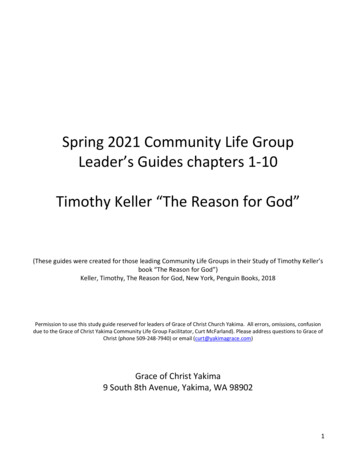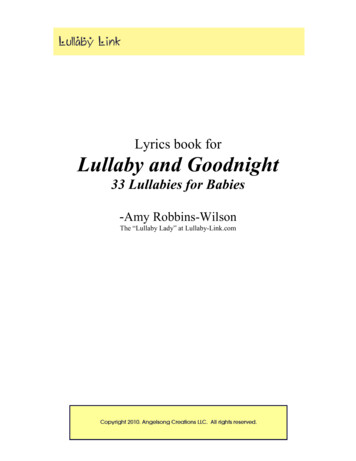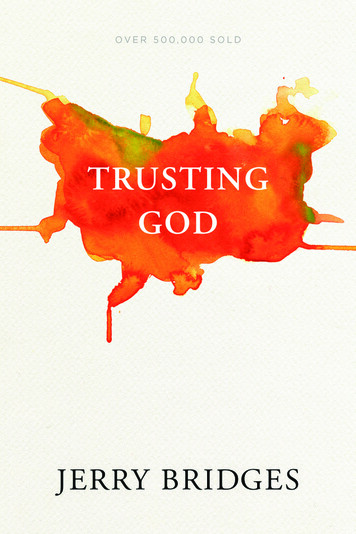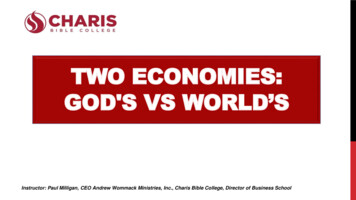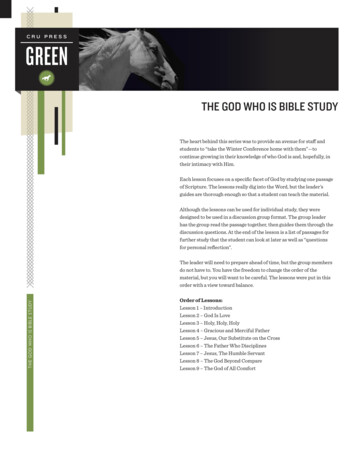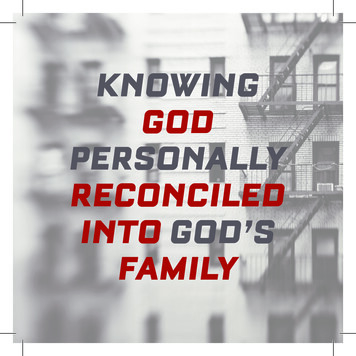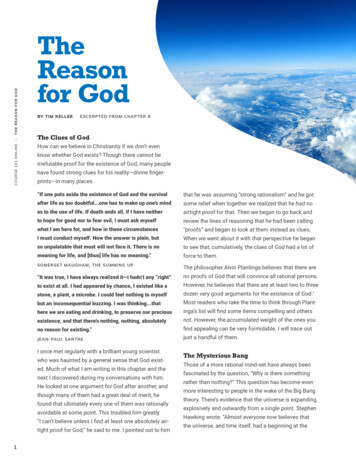
Transcription
THE R EASON FOR GODCO U RS E 101 O N L INETheReasonfor GodBY T I M K E L L E REXCE R PT E D F RO M CHA PT E R 8The Clues of GodHow can we believe in Christianity if we don’t evenknow whether God exists? Though there cannot beirrefutable proof for the existence of God, many peoplehave found strong clues for his reality—divine fingerprints—in many places.“If one puts aside the existence of God and the survivalthat he was assuming “strong rationalism” and he gotafter life as too doubtful.one has to make up one’s mindsome relief when together we realized that he had noas to the use of life. If death ends all, if I have neitherairtight proof for that. Then we began to go back andto hope for good nor to fear evil, I must ask myselfreview the lines of reasoning that he had been callingwhat I am here for, and how in these circumstances“proofs” and began to look at them instead as clues.I must conduct myself. Now the answer is plain, butWhen we went about it with that perspective he beganso unpalatable that most will not face it. There is noto see that, cumulatively, the clues of God had a lot ofmeaning for life, and [thus] life has no meaning.”force to them.S O M E RS E T M AU GHA M , T HE S UM M ING UPThe philosopher Alvin Plantinga believes that there are“It was true, I have always realized it—I hadn’t any “right”no proofs of God that will convince all rational persons.to exist at all. I had appeared by chance, I existed like aHowever, he believes that there are at least two to threestone, a plant, a microbe. I could feel nothing to myselfdozen very good arguments for the existence of God.ibut an inconsequential buzzing. I was thinking.thatMost readers who take the time to think through Plant-here we are eating and drinking, to preserve our preciousinga’s list will find some items compelling and othersexistence, and that there’s nothing, nothing, absolutelynot. However, the accumulated weight of the ones youno reason for existing.”find appealing can be very formidable. I will trace outJEA N - PAU L SA RT R Ejust a handful of them.I once met regularly with a brilliant young scientistwho was haunted by a general sense that God existed. Much of what I am writing in this chapter and thenext I discovered during my conversations with him.He looked at one argument for God after another, andthough many of them had a great deal of merit, hefound that ultimately every one of them was rationallyavoidable at some point. This troubled him greatly.“I can’t believe unless I find at least one absolutely airtight proof for God,” he said to me. I pointed out to him1The Mysterious BangThose of a more rational mind-set have always beenfascinated by the question, “Why is there somethingrather than nothing?” This question has become evenmore interesting to people in the wake of the Big Bangtheory. There’s evidence that the universe is expandingexplosively and outwardly from a single point. StephenHawking wrote: “Almost everyone now believes thatthe universe, and time itself, had a beginning at the
Big Bang.”ii Scientist Francis Collins puts this clue inWhen you look from the perspective of a scientist at thelayman’s language in his book The Language of God:universe, it looks as if it knew we were coming. ThereWe have this very solid conclusion that the universeare 15 constants—the gravitational constant, varioushad an origin, the Big Bang. Fifteen billion years ago,the universe began with an unimaginable bright flash ofenergy from an infinitesimally small point. That impliesTHE R EASON FOR GODthat before that, there was nothing. I can’t imagine hownature, in this case the universe, could have createditself. And the very fact that the universe had a beginningthat have precise values. If any one of those constantswas off by even one part of a million, or in some cases,by one part in a million million, the universe could nothave actually come to the point where we see it. Matterwould not have been able to coalesce, there would haveimplies that someone was able to begin it. And it seemsbeen no galaxy, stars, planets or people.vito me that had to be outside of nature.iiiEverything weSome have said that it is as if there were a large num-know in this world is “contingent,” had a cause outsideof itself. Therefore the universe, which is just a hugepile of such contingent entities, would itself have to beCO U RS E 101 O N L INEconstants about the strong and weak nuclear force, etc.—dependent on some cause outside of itself. Somethinghad to make the Big Bang happen—but what? What couldthat be but something outside of nature, a supernatural,non- contingent being that exists by itself?ber of dials that all had to be tuned to within extremelynarrow limits—and they were. It seems extremelyunlikely that this would happen by chance. StephenHawking concludes: “The odds against a universe likeours emerging out of something like the Big Bang areenormous. I think there are clearly religious implications.”vii Elsewhere he says, “It would be very difficult toSam Harris, in his review of Francis Collins’ book,explain why the universe would have begun in just thismakes the classic objection to this line of reasoning.way except as the act of a God who intended to create“In any case,” he writes, “even if we accepted that ourbeings like us.”viiiuniverse simply had to be created by an intelligentbeing, this would not suggest that this being is the Godof the Bible.”iv This is perfectly right. If we are looking atthis as an argument proving the existence of a personal God, it doesn’t get us all the way there. However,if we are looking for a clue—a clue that there is something besides the natural world—it is very provocativefor many people.The Cosmic Welcome MatFor organic life to exist, the fundamental regularitiesThe odds against auniverse like ours emergingout of something like theBig Bang are enormous.I think there are clearlyreligious implications.and constants of physics—the speed of light, the gravitational constant, the strength of the weak and strongThis has been called the “Fine-Tuning Argument” ornuclear forces— must all have values that together fallthe “Anthropic Principle,” namely that the universe wasinto an extremely narrow range. The probability of thisprepared for human beings. As an argument it must beperfect calibration happening by chance is so tiny as toa pretty powerful one, because there are a lot of fiercebe statistically negligible.v Again, Collins puts it well:rebuttals being published about it.The most common rejoinder, which Richard Dawkinsmakes in his book The God Delusion, is that there maybe trillions of universes. Given the enormous number ofuniverses existing over enormous amounts of time andspace, it is inevitable that some of them are fine-tunedto sustain our kind of life. The one we are in is one, sohere we are.ix2
THE R EASON FOR GODCO U RS E 101 O N L INEAgain, as a “proof,” the Fine-Tuning Argument is ratio-observed cases to all cases of the same kind.nally avoidable. Though there’s not a shred of proofWithout inductive reasoning we couldn’t learn fromthat there are many universes, there’s also no way toexperience, we couldn’t use language, we couldn’t relyprove that there aren’t.on our memories.However, as a clue, this line of thinking has force. AlvinMost people find that normal and untroubling. But notPlantinga gives this illustration. He imagines a manphilosophers! David Hume and Bertrand Russell, asdealing himself twenty straight hands of four aces ingood secular men, were troubled by the fact that wethe same game of poker. As his companions reach forhaven’t got the slightest idea of why nature-regularity istheir six-shooters the poker player says, “I know it lookshappening now, and moreover we haven’t the slight-suspicious! But what if there is an infinite successionest rational justification for assuming it will continueof universes, so that for any possible distribution oftomorrow. If someone would say, “Well the futurepoker hands, there is one universe in which the pos-has always been like the past in the past,” Hume andsibility is realized? We just happen to find ourselvesRussell reply that you are assuming the very thing youin one where I always deal myself four aces withoutare trying to establish. To put it another way, sciencecheating!” This argument will have no effect on thecannot prove the continued regularity of nature, it canother poker players. It is technically possible that theonly take it on faith.xman just happened to deal himself twenty straighthands of four aces. Though you could not prove hehad cheated, it would be unreasonable to concludethat he hadn’t.who have argued that modern science arose in its mostsustained form out of Christian civilization because ofits belief in an all-powerful, personal God who createdThe philosopher John Leslie poses a similar illus-and sustains an orderly universe.xii As a proof for thetration. He imagines a man who is sentenced to beexistence of God, the regularity of nature is escapable.executed by a firing squad consisting of fifty expertYou can always say, “We don’t knowmarksmen. They all fire from six feet away and notwhy things are as they are.” As a clue for God,one bullet hits him. Since it is possible that even experthowever, it is helpful.ximarksmen could miss from close range it is technicallypossible that all fifty just happened to miss at the samemoment. Though you could not prove they had conspired to miss, it would be unreasonable to draw theconclusion that they hadn’t.It is technically possible that we just happened to be inthe one universe in which organic life occurred. Thoughyou could not prove that the fine-tuning of the universewas due to some sort of design, it would be unreasonable to draw the conclusion that it wasn’t. Althoughorganic life could have just happened without a Creator,does it make sense to live as if that infinitely remotechance is true?The Regularity of NatureThere is something about nature that is much morestriking and inexplicable than its design. All scientific,inductive reasoning is based on the assumption ofthe regularity (the “laws”) of nature, that water willboil tomorrow under the identical conditions of today.The method of induction requires generalizing from3There have been many scholars in the last decades
The Clue of BeautyArthur C. Danto, the art critic at the Nation, once described a work of art that gave him a sense of “obscurebut inescapable meaning.”xiii In other words, whilegreat art does not “hit you over the head” with a simplemessage, it always gives you a sense that life is notTHE R EASON FOR GODa “tale told by an idiot, full of sound and fury, signifying nothing.” It fills you with hope and gives you thestrength to carry on, though you cannot define what itis that moves you.Leonard Bernstein once rhapsodized about the effectof Beethoven on him:CO U RS E 101 O N L INEBeethoven.turned out pieces of breath-taking rightness. Rightness–that’s the word! When you get thefeeling that whatever note succeeds the last is the onlypossible note that can rightly happen at that instant, inthat context, then chances are you’re listening to Beethoven. Melodies, fugues, rhythms— leave them to theTchaikovskys and Hindemiths and Ravels. Our boy hasthe real goods, the stuff from Heaven, the power to makeyou feel at the finish: Something is right in the world.There is something that checks throughout, that followsits own law consistently: something we can trust, thatwill never let us down.xivIf there is no God, and everything in this world is theproduct of (as Bertrand Russell famously put it) “anaccidental collocation of atoms,” then there is no actualpurpose for which we were made—we are accidents.If we are the product of accidental natural forcesthen what we call “beauty” is nothing but a neurological hardwired response to particular data. You onlyfind certain scenery to be beautiful because you hadancestors who knew you would find food there andthey survived because of that neurological feature andnow we have it too. In the same way, though musicfeels significant, that significance is an illusion. Lovetoo must be seen in this light. If we are the result ofblind natural forces, then what we call “love” is simplya biochemical response, inherited from ancestors whosurvived because this trait helped them survive.Bernstein and Danto are testifying to the fact that eventhough we as secular people believe that beauty andlove are just biochemical responses, in the presenceof great art and beauty we inescapably feel that thereis real meaning in life, there is truth and justice that4
THE R EASON FOR GODCO U RS E 101 O N L INERegardless of thebeliefs of our mindabout the randommeaninglessness of life,before the face of beautywe know better.mind about the random meaninglessness of life, beforethe face of beauty we know better.“So what?” someone might object. “Just because wefeel something is true doesn’t make it so!” Are we, however, only talking about feeling here? What is evokedin these experiences is, more accurately, appetite ordesire. Goethe refers to this as selige sehnsucht—blessed longing. We not only feel the reality but alsothe absence of what we long for.St. Augustine in his Confessions reasoned that theseunfulfillable desires are clues to the reality of God. Howwill never let us down, and love means everything.Notice that Bernstein, though by no means an orthodox religious person, can’t refrain from even using theterm “Heaven” when talking about Beethoven. We may,therefore, be secular materialists who believe truth andjustice, good and evil, are complete illusions. But in thepresence of art or even great natural beauty, our heartstell us another story.Another prominent artist who is apparently tellingus the same thing is John Updike. In his short story“Pigeon Feathers” a young teenager says to his mother,“Don’t you see, if when we die there’s nothing, all yoursun and fields and what not are all, ah, horror? It’s justan ocean of horror.” Later, in the presence of the beautyof pigeon feathers, of their texture and color, he isoverwhelmed by a certainty that there is a God behindthe world who will allow him to live for eternity.xv Updikeseems to be saying that regardless of the beliefs of our5so? Indeed (as it was just objected) just because wefeel the desire for a steak dinner doesn’t mean we willget it. However, while hunger doesn’t prove that theparticular meal desired will be procured, doesn’t theappetite for food in us mean that food exists? Isn’t ittrue that innate desires correspond to real objects thatcan satisfy them, such as sexual desire (correspondingto sex), physical appetite (corresponding to food), tiredness (corresponding to sleep) and relational desires(corresponding to friendship)?Doesn’t the unfulfillable longing evoked by beautyqualify as an innate desire? We have a longing for joy,love, and beauty that no amount or quality of food, sex,friendship, or success can satisfy. We want somethingthat nothing in this world can fulfill. Isn’t that at least aclue that this “something” that we want exists?xvi Thisunfulfillable longing, then, qualifies as a deep, innatehuman desire, and that makes it a major clue thatGod is there.
The Clue-KillerIn our culture there is a very influential school ofthought that claims to have the answers to all of theseso-called clues. This is the school of evolutionary biology that claims everything about us can be explainedas a function of natural selection. A book that seeks toCO U RS E 101 O N L INETHE R EASON FOR GODexplain all clues about God in this way is Breaking theSpell: Religion as a Natural Phenomenon by Daniel Dennett. Dennett claims that if we have religious feelings itis only because those traits once helped certain peoplesurvive their environment in greater numbers and therefore passed that genetic code on to us. He sums up hisview when he writes:Everything we value—from sugar and sex and money tomusic and love and religion—we value for reasons. Lyingbehind, and distinct from, our reasons are evolutionaryreasons, free-floating rationales that have beenendorsed by natural selection.xviiIn The New York Times Magazine, Robin Marantz Henigsurveyed what evolutionists think about religion in anarticle, “Why Do We Believe? How Evolutionary ScienceExplains Faith in God.”xviii We know that “the idea of aninfallible God is comfortable and familiar, somethingchildren readily accept.”xix Why? Some evolutionistsBelief in God is anaccidental by-product ofother traits that did giveadaptive advantage.such as David Sloan Wilson think belief in God madepeople happier and more unselfish, which meant theirfamilies and tribes survived and they got better mates.Others such as Scott Atran and Richard Dawkins positthat belief in God is an accidental by-product of othertraits that did give adaptive advantage. Our ancestors who survived were most prone to detect agentsin the brush even when they weren’t there, and weremost likely to impose narratives, causal reasoning, oneverything that happened around them. However, thesesame traits make us more likely to believe in God—tosee agents and narratives and intelligences where theydon’t actually exist.xxDespite fierce debates within the field, evolutionarytheorists all agree that our capacity to believe in God ishardwired into our physiology because it was directly orindirectly associated with traits that helped our ancestors adapt to their environment. That’s why argumentsfor God appeal to so many of us. That’s all there is to it.The clues are clues to nothing.6However, there are many who believe not only that theclue-killer argument has a fatal contradiction in it, butthat it actually points to another clue for God.In the last part of Dawkins’s The God Delusion he admits that since we are the product of natural selection,we can’t completely trust our own senses. After all,evolution is interested only in preserving adaptive behavior, not true belief.xxi In a New York Times Magazinearticle, another scientist says, “in some circumstancesa symbolic belief that departs from factual reality faresbetter.”xxii In other words, paranoid false beliefs are often more effective at helping you survive than accurateones.I don’t believe Dawkins or other evolutionary theoristsrealize the full implications of this cruel insight. Evolution can only be trusted to give us cognitive facultiesthat help us live on, not to provide ones that give usan accurate and true picture of the world around us.xxiiiPatricia Churchland puts it like this:
The principle chore of [brains] is to get the body partswhere they should be in order that the organism maysurvive. Improvements in sensorimotor control confer anevolutionary advantage: a fancier style of representing[the world] is advantageous so long as it.enhances theorganism’s chances for survival. Truth, whatever that is,THE R EASON FOR GODtakes the hindmost.xxivThomas Nagel, the prominent philosopher and atheist,agrees in the last chapter of his book The Last Word.He writes that to be sure my mind is telling me whatis really, truly out there in the world, I must “follow therules of logic because they are correct—not merelybecause I am biologically programmed to do so.” However, according to evolutionary biology laws of reasonCO U RS E 101 O N L INEIf our cognitive facultiesonly tell us what we needto survive, not what istrue, why trust them aboutanything at all?would have to make sense to us only because they helpus survive, not because they necessarily tell us truth.So, Nagel asks:[Can we have any] continued confidence in reason as asource of knowledge about the nonapparent character ofthe world? In itself, I believe an evolutionary story [of thehuman race] tells against such confidence.xxvEvolutionists say that if God makes sense to us, it isnot because he is really there, it’s only because thatbelief helped us survive and so we are hardwired for it.However, if we can’t trust our belief-forming faculties totell us the truth about God, why should we trust them totell us the truth about anything, including evolutionaryscience? If our cognitive faculties only tell us what weneed to survive, not what is true, why trust them aboutanything at all?It seems that evolutionary theorists have to do one oftwo things. They could backtrack and admit that wecan trust what our minds tell us about things, includingGod. If we find arguments or clues to God’s existencethat seem compelling to us, well, maybe he’s reallythere. Or else they could go forward and admit that wecan’t trust our minds about anything. What is not fair isto do what so many evolutionary scientists are doingnow. They are applying the scalpel of their skepticismto what our minds tell us about God but not to what ourminds are telling us about evolutionary science itself.This is a huge Achilles’ heel in the whole enterprise ofevolutionary biology and theory. Alvin Plantinga pointsout that Charles Darwin himself saw this major vulnerability. To a friend, Darwin wrote that:The horrid doubt always arises whether the convictionsof man’s mind, which has been developed from themind of the lower animals, are of any value or at alltrustworthy.xxviPlantinga then proceeds to argue that it is ultimatelyirrational to accept evolutionary “naturalism,” the theorythat everything in us is caused only by natural selection. If it were true, we couldn’t trust the methods bywhich we arrived at it or any scientific theory at all.xxvii7
People like Dawkins hold that there is a conflict betweenscience and religion.the truth of the matter, however, isthat the conflict is between science and naturalism, notbetween science and belief in God. It’s as likely, givenunguided evolution, that we live in a sort of dream worldas that we actually know something about ourselves andTHE R EASON FOR GODour world.xxviiiDespite popular books like those of Dennett, Dawkins,and Harris, which try to use the evolutionary clue-killeron religion, more and more thinkers are seeing throughit, and not just orthodox believers, but those like Thomas Nagel. Leon Wieseltier, the literary editor of The NewRepublic, points out the flaw in the clue-killer argumentCO U RS E 101 O N L INEin his review of Dennett’s book Breaking the Spell.[Dennett] portrays reason in service to natural selection,and as a product of natural selection. But if reason is aproduct of natural selection, then how much confidencecan we have in a rational argument for natural selection?The power of reason is owed to the independence ofreason, and to nothing else. Evolutionary biology cannotinvoke the power of reason even as it destroys it.xxixIt comes down to this: If, as the evolutionary scientistssay, what our brains tells us about morality, love, andbeauty is not real—if it is merely a set of chemical reactions designed to pass on our genetic code—then so iswhat their brains tell them about the world. Then whyshould they trust them?The Clue-Killer is Really a ClueI think that ultimately the supposed clue-killer ends upshowing us one more clue for God to put beside theothers.The first clue is the very existence of the world, theBig Bang. The secular person rightly responds, “Butthat doesn’t prove God exists. Maybe the Big Bang justcaused itself.” The second clue is the fine-tuning ofthe universe, the one-in- a-trillion-trillion chance thatour universe supports organic and human life. Againthe secular person can very fairly respond: “But thatdoesn’t prove God. It could be through sheer randomcircumstance that this universe is the one that wasformed.” Another clue is the regularity of nature. All scientific, inductive reasoning is based on the assumptionof this, though we haven’t the slightest rational justification for assuming it will continue. When believershave responded that this is a clue to God’s existence,8
nonbelievers retort, rightly, “We don’t know why naturethat nature will go on regularly, but you continue to useis regular, it just is. That doesn’t prove God.”inductive reasoning and language. You have no goodAnother clue is the clue of beauty and meaning. If weare the product of the meaningless, accidental forcesCO U RS E 101 O N L INETHE R EASON FOR GODof nature, believers ask, how do you account for thebeauty matter, but you keep on doing it. C.S. Lewisputs this vividly:sense we have that beauty matters, that love and lifeYou can’t, except in the lowest animal sense, be in loveare significant? The secular person responds: “Thiswith a girl if you know (and keep on remembering) thatdoesn’t prove God. We can explain all such ‘senses’ andall the beauties both of her person and of her characterconvictions through evolutionary biology. Our religious,are a momentary and accidental pattern produced by theaesthetic, and moral intuitions are there only becausecollision of atoms, and that your own response to themthey helped our ancestors survive.” However, as manyis only a sort of psychic phosphorescence arising fromthinkers point out, if this argument proves anything atthe behavior of your genes. You can’t go on getting veryall it proves too much. If we can’t trust our belief-form-serious pleasure from music if you know and remembering faculties in one area, we should not trust themthat its air of significance is a pure illusion, that youin any area. If there is no God, we could not trust ourlike it only because your nervous system is irrationallycognitive faculties at all.conditioned to like it.xxxOh, but we do, and that’s the final clue. If we believeOf course none of the clues we have been looking forGod exists, then our view of the universe gives us aactually proves God. Every one of them is rationallybasis for believing that cognitive faculties work, sinceavoidable. However, their cumulative effect is, I think,God could make us able to form true beliefs and knowl-provocative and potent. Though the secular view of theedge. If we believe in God, then the Big Bang is notworld is rationally possible, it doesn’t make as muchmysterious, nor the fine-tuning of the universe, nor thesense of all these things as the view that God exists.regularities of nature. All the things that we see makeThat’s why we call them clues. The theory that there isperfect sense. Also, if God exists our intuitions abouta God who made the world accounts for the evidencethe meaningfulness of beauty and love arewe see better than the theory that there is no God.to be expected.Those who argue against the existence of God go rightIf you don’t believe in God, not only are all these thingsprofoundly inexplicable, but your view—that there is noGod— would lead you not to expect them. Though youhave little reason to believe your rational faculties work,you go on using them. You have no basis for believing9reason to trust your senses that love andon using induction, language, and their cognitivefaculties, all of which make far more sense in auniverse in which a God has created and supportsthem all by his power.
EndnotesiA survey can be found in Alvin Plantinga’s lecture notes, “Two Dozen (or so) The-istic Arguments,” available at sticarguments.html and many other places on the Internet. See also the summary ofWilliam C. Davis, “Theistic Arguments,” in Murray, Reason for the Hope Within.iiStephen Hawking and Robert Penrose, The Nature of Time and Space (PrincetonCO U RS E 101 O N L INETHE R EASON FOR GODUniversity Press, 1996), p.20.iiiIn an interview on Salon.com, /index2.html, last accessed on March 9, 2007.ivHarris, Sam. http://www.truthdig.com/report/page2/20060815)sam harris lan-guage ignorance/, last accessed on March 9, 2007vFor a short summary of this argument see Robin Collins, “A Scientific Argumentfor the Existence of God: The Fine-Tuning Design Argument,” Reason for the HopeWithin, Michael J. Murray, ed. (Eerdmans, 1999).viIn an interview on Salon.com, /index2.html, last accessed March 9, 2007.viiBoslough, John. Stephen Hawking’s Universe (Avon, 1989), p.117.viiiHawking, Stephen. A Brief History of Time (Bantam, 1998), p.131.ixSee Richard Dawkins, The God Delusion (Houghton Mifflin, 2006), p.107.x.From Alvin Plantinga, “Dennett’s Dangerous Idea,” in Books and Culture (May-June 1996): 35xiRecounted in Collins, “A Scientific Argument,” p.77.xiiSee “Science Gets Strange” in C. John Sommerville, The Decline of the SecularUniversity (Oxford University Press, 2006). See also Diogenes Allen, Christian Beliefin a Post-Modern World (John Knox, 1989).xiiiArthur Danto,”Pas de Deux, en Masse: Shirin Neshat’s Rapture,” The Nation, June28, 1999.xivFrom Leonard Bernstein’s “The Joy of Music” (Simon and Schuster, 2004),p.105.xvQuoted by Robin Marantz Henig in her article “Why Do We Believe?” in The NewYork Times Magazine, March 4, 2007, p.58.xviThe classic statement of this argument is found in the chapter on “Hope” in C.S.Lewis, Mere Christianity (Macmillan)xviiQuoted in Leon Wieseltier, “The God Genome,” New York Times Book Review,February 19, 2006.xviiiThe New York Times Magazine, March 4, 2007.xixHenig, “Why Do We Believe?” p.43.xxIbid., p.58.xxiDawkins, The God Delusion, p.367ff, “Our brains themselves are evolved or-gans evolved to help us survive.”10
xxiiHenig, p.7.xxiiiIn his foreword to Richard Dawkins’s The Selfish Gene, Robert Trivers notedDawkins’s emphasis on the role of deception in animal life, and added if indeed “deceit is fundamental to animal communication, then there must be strong selection tospot deception and this ought, in turn, to select for a degree of self-deception, rendering some facts and motives unconscious so as not to betray – by the subtle signs ofCO U RS E 101 O N L INETHE R EASON FOR GODself-knowledge – the deception being practiced.” Therefore, “the conventional viewthat natural selection favors nervous systems which produce ever more accurateimages of the world mu
4 THE REASON FOR GOD CRE NNE The Clue of Beauty Arthur C. Danto, the art critic at the Nation, once de- scribed a work of art that gave him a sense of “obscure but inescapable meaning.”xiii In other words, while

